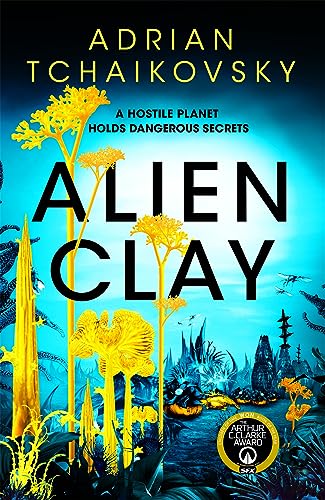Phil in SF reviewed Alien Clay by Adrian Tchaikovsky (duplicate)
Interesting take on the prison planet trope
5 stars
I was hooked from the start with Tchaikovsky's description of sending prisoners to Kiln as freeze-dried corpsicles that are reanimated on arrival. Actually doable? Actually money-saving? Hell if I know. Grabbed my attention.
Kiln has life. Not only does it have life, it has monuments built be an intelligent species, but there's no sign of them. That's a secret that was kept from Earth by it's rulers, the Mandate. Arton Daghdev, our protagonist is an unorthodox xenobiologist. A prisoners because of the unorthodoxy. But also he didn't know because it was kept so tightly secret. And the last part of of the premise is that there aren't exactly species on Kiln. The flora and fauna, such as they are, are more agglomerations of species with one purpose each: a stomach and an eye and a leg muscle get together to form a symbiotic creature. But they can all split up …
I was hooked from the start with Tchaikovsky's description of sending prisoners to Kiln as freeze-dried corpsicles that are reanimated on arrival. Actually doable? Actually money-saving? Hell if I know. Grabbed my attention.
Kiln has life. Not only does it have life, it has monuments built be an intelligent species, but there's no sign of them. That's a secret that was kept from Earth by it's rulers, the Mandate. Arton Daghdev, our protagonist is an unorthodox xenobiologist. A prisoners because of the unorthodoxy. But also he didn't know because it was kept so tightly secret. And the last part of of the premise is that there aren't exactly species on Kiln. The flora and fauna, such as they are, are more agglomerations of species with one purpose each: a stomach and an eye and a leg muscle get together to form a symbiotic creature. But they can all split up and form other creatures somehow.
So Arton is doing two things: trying to figure out what happened to the builders, and fighting the Mandate as its prisoner. He's got gallows humor in spades. He's also a somewhat unreliable narrator, though it's mostly lies by omission. The story drags in parts. When Arton merits extra punishment, he goes into overlong detail on that punishment. And lastly, the suspicious nature of a subjugated population is hammered home again and again. Yes, I get it that people, especially prisoners, are going to wonder who the snitches are. But by the 5th or 6th time Tchaikovsky and Daghdev go into it I was just wanted to move on.
But Tchaikovsky also ties it all together pretty nicely. The nature of life on Kiln is especially vexing for a totalitarian orthodoxy, and provides some distinct advantages when the conflict between them comes.
Half a star off because it does kind of drag in places.




